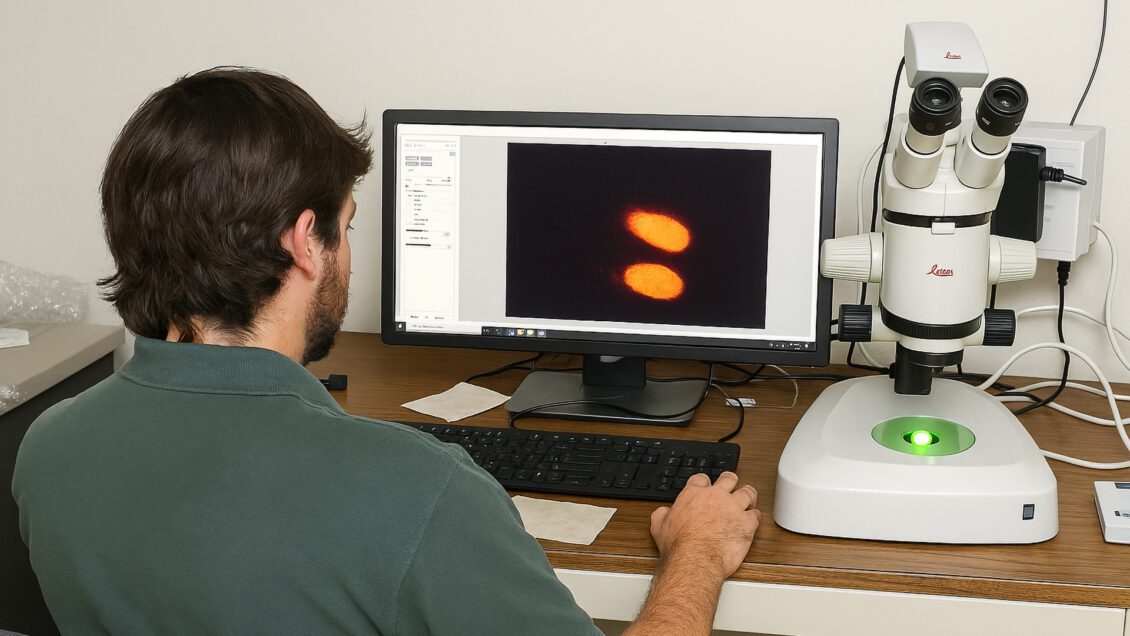
Jacob Johnson, a Clemson University master’s student in plant and environmental sciences, is helping shape the future of cotton farming through cutting-edge gene editing research.
Originally from Conway, South Carolina, Johnson is part of a multidisciplinary team of scientists working on Building Better Cotton: Gene Editing to Improve Oil, Protein and Fiber Quality in Upland Cotton.
“This research is significant for the future of cotton farming,” Johnson said. “It’s exciting to be part of a team using cutting-edge genetic tools to solve real-world agricultural problems.”
From discovery to application
Christopher Saski, a plant geneticist and translational scientist in Clemson’s College of Agriculture, Forestry and Life Sciences, is leading this initiative. The project is funded by the U.S. Department of Agriculture’s National Institute of Food and Agriculture (USDA-NIFA) and Cotton Incorporated.
Don Jones of Cotton Incorporated serves as a co-investigator. Sonika Kumar, a senior scientist and postdoctoral fellow in Saski’s lab, is also a co-investigator.
The project builds on a previous USDA-NIFA-funded study that focused on gene discovery. The current phase translates those discoveries into practical applications using CRISPR-Cas12a and other advanced genetic engineering tools. The team aims to develop high-yielding Upland cotton varieties with Pima-like fiber quality, enhanced seed traits and resistance to Fusarium wilt (FOV4)—a disease that has devastated cotton crops across the U.S.
The goal is to create a dual-purpose crop that boosts economic and environmental sustainability for cotton growers.
A student’s role in high-impact research

The project allows Johnson to gain hands-on experience in genetic engineering, molecular biology and scientific writing—skills he plans to carry into a future career in agricultural biotechnology research.
“This project is giving me a better grasp of the current state of advanced cotton improvement,” he said. “It’s also preparing me for the scientific publication process, which is essential for a research career.”
Saski praised Johnson’s contributions, noting, “Jacob is a great example of how graduate students can contribute meaningfully to high-impact research that can rapidly translate into application.”
Johnson intends to pursue a doctoral degree.
Mentorship and innovation
Kumar, who oversees the plant tissue culture and regeneration pipelines, is mentoring Johnson. Her research credits include developing one of the most efficient cotton gene editing systems available today.
Kumar’s expertise spans genetics, molecular biology and plant biology. She previously led a groundbreaking study on plant stem cells aboard the International Space Station and developed a regeneration platform for peaches.
For this project, she is guiding the selection of candidate genes and managing the transformation and regeneration steps to create genetically engineered cotton lines with improved oilseed traits.
Cotton’s economic impact and Clemson’s broader research

Cotton remains a vital crop for South Carolina. According to the South Carolina Department of Agriculture, it is one of the state’s top commodities. In 2024, growers planted 225,000 acres of Upland cotton, generating more than $144 million in production value.
Saski’s research portfolio extends beyond this project. He has collaborated with Australian scientists to combat Fusarium wilt, sent cotton genome research to the International Space Station and contributed to studies published in journals like Nature Genetics and Nature Plants. His work also explores herbicide resistance, climate-resilient cotton varieties and designer cottonseed.
As the gene editing project progresses, Johnson and the team hope their work will lead to the release of novel cotton germplasm that benefits breeders, farmers and the broader agricultural community.
For more information about Clemson’s College of Agriculture, Forestry and Life Sciences programs, visit Clemson CAFLS.
-END-




Clemson University scientists Jacob Johnson, Christopher Saski and Sonika Kumar use gene editing to develop high-yielding Upland cotton varieties.
Get in touch and we will connect you with the author or another expert.
Or email us at news@clemson.edu
